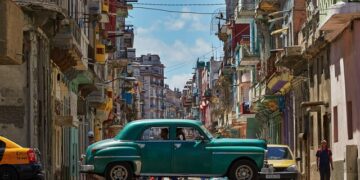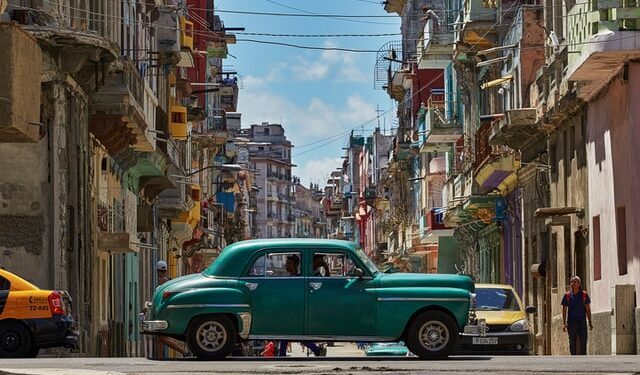HAVANA TIMES — There is no doubt that the 60-year US embargo on Cuba has forced the Communist Party government to find other markets for both imports and exports, often less favorable than dealing with their neighbor only 90 miles away under normal conditions.
However, the embargo has exempt food purchases for around two decades, just like it does with medicines. The problem for Cuban state importers, the only ones allowed, is hard currency to pay for the products. Under the embargo, Cuba has no credit options for its purchases from US suppliers.
The island’s failed agricultural policies which promote dependence on imports instead of national production baffles those that visit the country and see so much fallow land and know that Cuba’s agronomists and farmers have a wealth of knowledge that could lead to food security someday, maybe by the hundredth anniversary of the revolution. For now, consumers must depend on farmers from “the enemy” and other countries.
There lies a terrible irony. While the Cuban government complains about the effects of the US embargo, once again this year much of the food on the island’s Xmas tables will come from the United States and other countries.
Another irony is that Cuban agronomists, both on government-to-government exchanges and on their own, are helping production in several other countries seeking to improve their food security and even exports.
What I once heard where I was working in Havana, during nationwide meetings called in 2008 by then President Raul Castro to give people a rare opportunity to express their concerns sums things up. Someone asked: When are the agronomists we see on TV going to start working in Cuba? It brought a roar of laughter, and everybody knew exactly what the person was talking about.
A report from 14ymedio
So that brings us to the matter at hand, this years Christmas tables amid a tremendous national shortage of the most basic food products. The Havana based independent daily 14ymedio reports on the situation.
“Pork legs from the United States, milk from Spain and Mexican beans. At the tables of Cuban families, imported products outnumber the number and quality of the few foods that come out of the nation’s fields and industries. Simply writing “imported” next to an offer to makes customers feel more confident and seduced.” And often they don’t even have a choice like with the beer from Spain or sugar from France.
In the case of pork, the national favorite meat, producers can’t get the feed they need to have a healthy production.
“Pork takes on the flavor of the food you give the animal,” says El Pana, a pig producer from Alquízar, in Artemisa, whom 14ymedio has tracked since he started in the sector until he ended up, last year, dismantling his corrals, tired of not getting feed and affected by the entry restrictions to Havana due to the pandemic.
“When I was able to get fishmeal and the animal spent its fattening time eating that, then you threw a steak in the pan and it seemed that it was frying claria,” he says. “People have lost their reference and don’t even remember what pork tastes like, but I’ve been in this business for many years, and I know when a pig ate garbage and when they gave it something else.”
“In the fat and meat of the animal a lot of what it has eaten accumulates, as soon as you cut a leg or a shoulder blade, you can notice it by the tone of the upper. Imagine when you put it to cook, all that smell comes out and fills the house. I cannot sell what I myself would not eat, and here feeding a pig correctly is impossible.”
In El Pana’s opinion, this is one of the motivations for opting for the imported product, for those who can afford it. “You realize that they are younger pigs, because they managed to reach the weight for slaughter in the time it should be and not like it happens here that, as it does not have feed, time passes and the animal is still skinny. You can’t slaughter that way.”
Often the frozen chicken that Cubans wait in long lines to buy comes from abroad, from the US and South America, as the local industry is almost extinct.
“Not to mention chicken, it’s been a long time since almost everything has come from abroad,” acknowledges the producer. “Here in the area surrounding Alquízar we had several poultry farms, there is nothing left of that. Even the roofs and fences have been stolen little by little,” the pig farmer told 14ymedio.
While in many countries there is an increase in movements favorable to local commerce, which favors local products, in Cuba consumers with the money to do so are opting for imported food. Local consumption is barely concentrated in some produce, seasonal fruits, and vegetables, but with the rise in prices in recent months, sometimes a canned or frozen product is cheaper, notes 14ymedio.
“A pound of beans is above 90 pesos ($3.75 USD) when you can find it,” Victor Manuel, a retiree who frequently visits the agricultural market on San Rafael Street in Havana told 14ymedio. “To give it flavor, I must buy just a little chorizo or bacon, as well as add onion, garlic and other seasonings. When I take out an account, a fabada — bean stew — for my wife and for me comes out at more than 180 or 200 pesos.”
“My son, who lives in Miami, buys me cans of Asturian bean stew through stores and on the internet, which cost less than four dollars each. My wife and I eat with two without going back and forth to the agri-market and without so much mess with the pressure cooker. Cheaper and it has nothing to envy compared to what I could do in my kitchen with what little there is.”
“Before, at Christmas, almost everything that was eaten was from here, though perhaps the nougat or cider came from elsewhere, but now the table looks like the United Nations,” jokes Víctor Manuel. “What does not come from Mexico, comes from New Zealand. Crazy.”
This article is from the Havana Times, read the original here.
























































